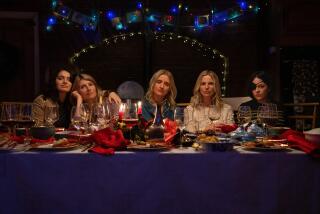Review: BBC’s ‘Call the Midwife’ is sweet, stirring medicine
- Share via
For the growing fan base of period drama, the BBC’s “Call the Midwife,” which debuts Sunday on PBS, fits in chronologically and somewhat thematically between “Downton Abbey” and “Mad Men.”
Set in London’s very pre-revitalized East End during the late 1950s and based on the memoir of Jennifer Worth, it chronicles the adventures of a group of midwives working at the Nonnatus House, a nursing convent named for the early cesarean-surviving patron saint of childbirth. Although first and foremost the tale of the plucky middle-class “gels” (hard g) learning about life, “Call the Midwife” is also a quite timely valentine to socialized medicine.
VIDEO: Fall TV premieres and trailers
The midwives, as well as the clinics, doctors and ambulance drivers who tend to the East End’s poor, are all employees of Britain’s then-newly established National Health Service and nary an episode goes by without the reminder, often via voice-over by the glorious Vanessa Redgrave, that this baby or that mother would have most certainly died without the services provided by the NHS.
The stories revolve around the young and comely Jenny Lee (Jessica Raine) who becomes a midwife out of a desire to do good but also to escape the perils of a thwarted romance. She joins two other young women, as well as a terrific quartet of nuns including Sister Monica-Joan (Judy Parfitt), an original midwife whose slide into old age is marked by poetic yet shrewd observations and a love of sweets, and Sister Evangelina (the always wonderful Pam Ferris), a tart-tongued child of poverty with no time for emotional shilly-shallying. Sister Julienne (Jenny Agutter) runs the place, and not since “The Sound of Music’s” Mother Superior have we seen such regal kindliness.
In the second episode, comedian Miranda Hart joins the show as Camilla “Chummy” Fortescue-Cholmondeley-Browne, a young aristocrat as physically graceless as she is earnest; that she doesn’t yank the show out from under everyone’s feet is a testament to Heidi Thomas’ writing and the power of the ensemble.
You can’t beat the Brits for character acting and the nature of the story provides a cornucopia of marvelous small performances by the women and men playing the recipients of the midwives’ services. (Also more adorable babies than perhaps a woman in those perilous last-chance child-bearing years ought to see.)
Unapologetically sentimental, “Call the Midwife” does not shy away from the ghastly conditions in which many East Enders lived at this time but the people one and all are portrayed within the narrow range of stoic and heroic. This allows the show to explore the grim issues of poverty, class and the plight of women without access to either education or birth control while maintaining a determinedly uplifting tone — chin up, girls, it’s going to get better! Some day enema nozzles won’t be made of glass!
Lovely and engaging, Raine makes Jenny sympathetic and sweet while still preserving the upper-middle class shock that is as much willful ignorance as innocence. You will laugh, you will cry and if it seems a bit treacly, it is. But as another very famous British caregiver once observed, a spoon full of sugar helps the medicine go down.
More to Read
The complete guide to home viewing
Get Screen Gab for everything about the TV shows and streaming movies everyone’s talking about.
You may occasionally receive promotional content from the Los Angeles Times.







